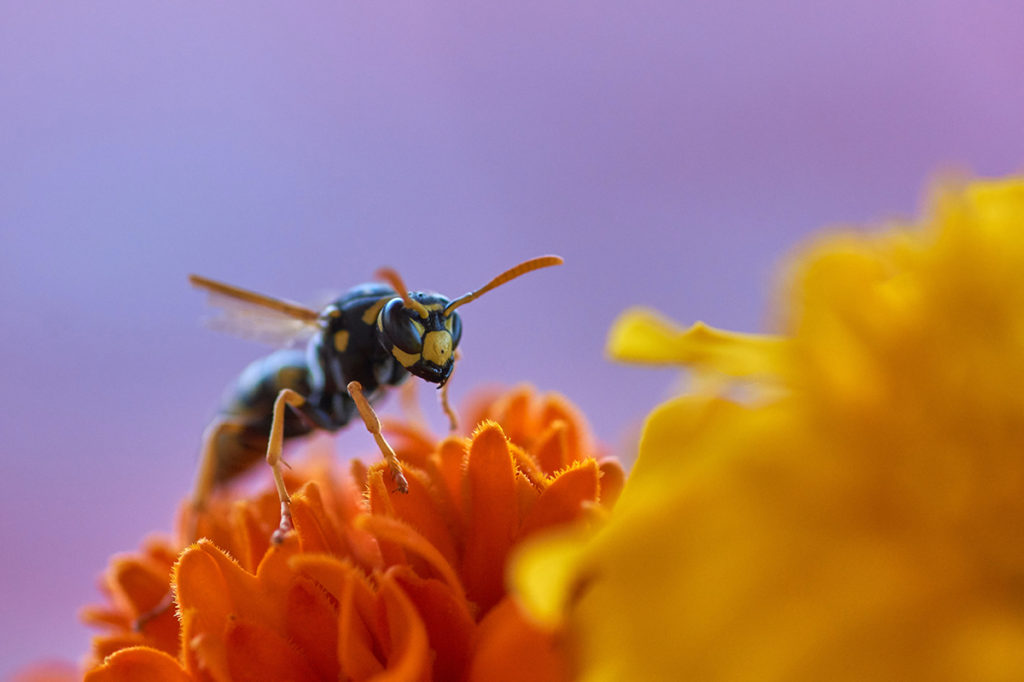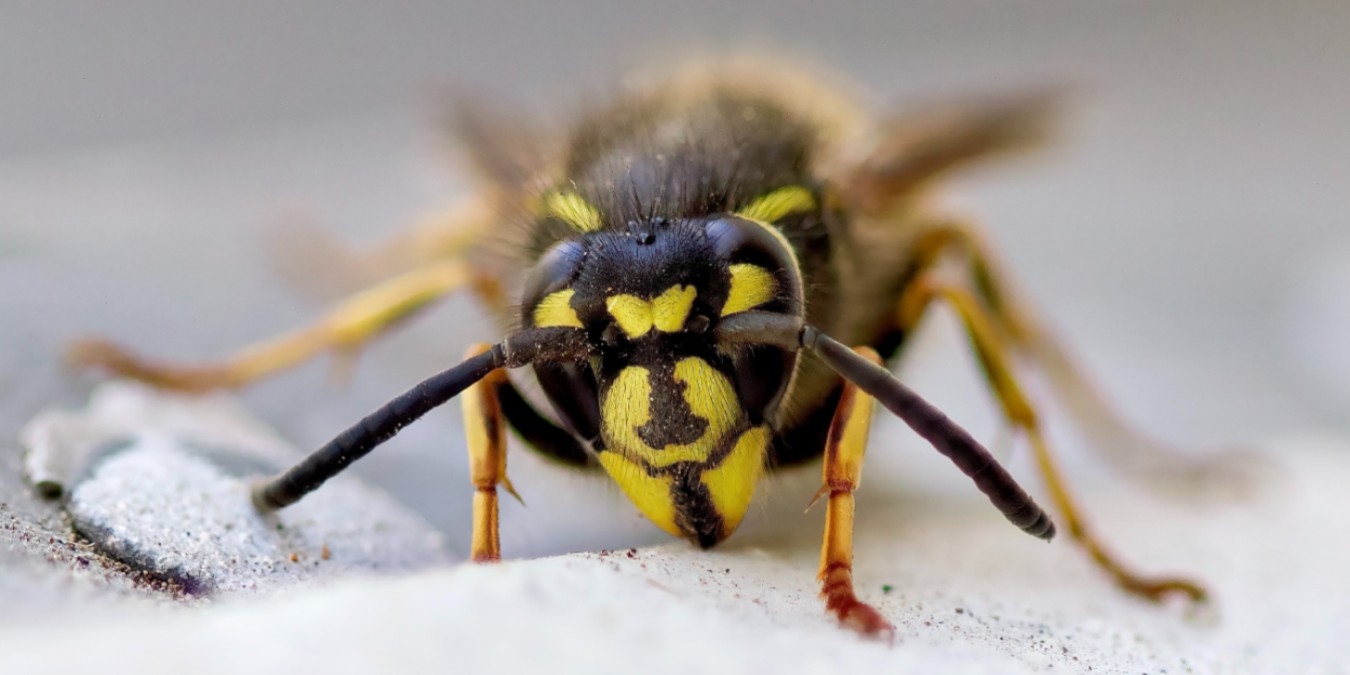We all look forward to the summer months. The longer days and the (hopefully!) better weather meaning we can spend more time outside, get the BBQ out and enjoy some good food with friends and family in the warm sun. We all also know that al fresco dining brings with it the dreaded wasps. Those pesky critters that have us jumping out of our seats, running around flapping our arms wildly in an attempt to scare them off. But have you ever wondered what happens to them in the winter? Do they go somewhere else? Do they hibernate? Or do wasps die in winter?
The answer to all of those questions is, yes! Let’s elaborate.
Do Wasps Hibernate or Die Off in Winter?
Much like you or me, wasps aren’t too keen on the cold weather and the simple answer is that the vast majority of them die off during the winter months. Not all of them, however…
During the summer a wasps nest can have anywhere from 5,000 to 10,000 wasps in it. Most of these wasps will be workers whose sole purpose is to provide for the nest. Also, they help their queen continue the genetic line.
When winter rolls around, however, there is a distinct lack of food, and certainly not enough to sustain 10,000 wasps per nest. While they don’t like the cold, it’s the lack of food that actually causes wasps to die in winter.
Wasps feed on nectar, insects, and fruit predominantly which are in abundance during the summer months. As the trees start to lose their leaves, fruit that was in abundance die off. With them die the insects, which means the wasp’s food supply dramatically decreases. No food, no wasps.
That’s not the whole story though. After all, we still have more wasps the next summer! So how do some wasps survive the winter?
Worker wasps die in winter, but young queen wasps hibernate instead. They find a nice cosy spot away from their old nests to lay their heads until the spring when the weather begins heating up again.
Queen wasps’ favourite spot for a nice winter bed is in attic spaces. We humans like to keep our houses warm in the winter. The heat that rises to the attic means that’s the ideal place for a sleepy queen.
Surviving their hibernation isn’t always guaranteed, however, as there are predators, like spiders, that will take full advantage of finding a hibernating queen!
To get to grips with all of this a little more, let’s have a look at the life cycle of a wasp and its nest…
Also Read: Are Termites Active in Winter?
The Life Cycle of a Wasp Queen
Once the winter months are through and the weather starts to turn a little warmer in spring, the hibernating young queen will wake and start working on building a new nest and colony for herself.
She does this by laying her first few eggs. She will look after these eggs until they hatch into workers (which are sterile female wasps).
These workers then set about helping the queen look after the next batch of eggs. The chores include bringing food, protecting the nest and helping the size of the nest grow.
By mid-summer, the queen will have produced enough workers to look after all the maintenance and feeding requirements for the nest. At this point, the queen’s job is nearly done. She has one last task she must complete – the laying of her final few eggs that will produce male drone wasps (for mating) and new fertile females (new queens to go off and create their own colonies).

These last wasps to hatch will leave the nest in autumn. They fly off and mate with other drones and young queens in the surrounding areas. The males will then promptly die as they have fulfilled their one task. On the other hand, the queens will find a nice spot to hibernate for the winter.
What happens to the rest of the nest? All the worker wasps die in winter, along with the old queen.
Then the cycle begins again with the new queens as spring comes around. Building their own nests, growing their own colonies, hatching their own queenlings, and then dying off come winter.
Wasps aren’t all Bad!
Bees are heralded as the great pollinators, fertilising our gardens, allowing the bloomage to flourish and grow. They are also the producers of our favourite natural sweetener, honey.
Wasps, on the other hand, are regarded as the bane of the summer months, the violent evil villains that are out to ruin your perfect picnic calm.
Wasps are fascinating creatures however, they get a bad reputation. They should be given a bit more respect as they do a lot more for us than you think.
Unlike bees, wasps are carnivorous and feed on aphids (or green flies as they are commonly called) in your garden. This is very important. It gives the plants a proper chance to thrive and flourish as aphids are sap-sucking insects that can distort the growth of plants. Aphids can also transmit plant viruses, so having someone controlling them is a real bonus.
Though it’s very rarely mentioned, wasps are also excellent pollinators, just like bees. So as well as protecting the plants they also help in a plant’s circle of life. Not bad!
So while we’re always happy to be rid of them in the winter when they die, we should also be happy to see them back in the summer months as it means our gardens will be protected.
Are Wasps Dangerous Though?
As a final point, we also wanted to dispel some common misconceptions around how dangerous wasps are and how violent they can be.
While it can feel like wasps sting people willy nilly for no apparent reason, they only sting when they feel threatened. So, flapping your arms out wildly doesn’t help! As with bees, if you leave them alone, they will leave you alone.
Wasps don’t tend to swarm as bees do. When you stumble into their territory wasps won’t swarm. However, if you are stung there is a pheromone in their venom that attracts nearby wasps and causes them to act more aggressively.
Wasps aren’t more dangerous than bees. While you’re more likely to hear of a wasp sting than a bee sting, this is generally because wasps tend to hide their nests. This means it’s harder to know when you are near one or not, rather than them actively being more aggressive.
It is extremely uncommon to suffer any sort of anaphylaxis to a wasp sting. Their venom is also completely different from bees, so if you’re allergic to bees that doesn’t mean your allergic to wasps. In fact, being allergic to both is incredibly rare.
While I’m sure we’re not going to change many minds about wasps, at least now you know – most wasps die in winter, but they will be back again next summer.
You May Also be Interested in Reading: What Do Whales Eat?

